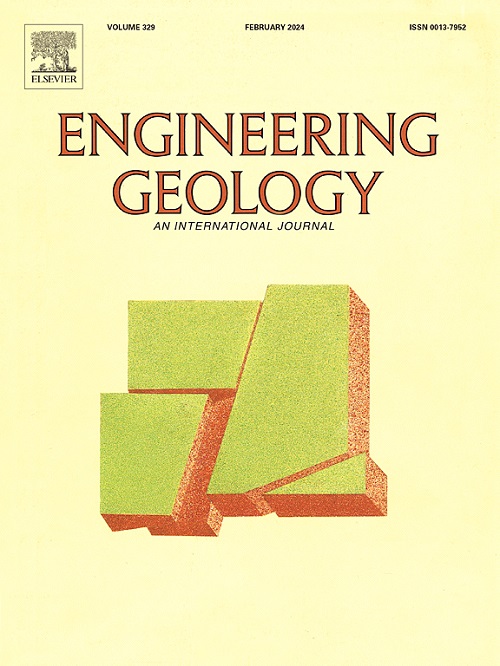Mitigating rainfall induced soil erosion through bio-approach: From laboratory test to field trail
IF 6.9
1区 工程技术
Q1 ENGINEERING, GEOLOGICAL
引用次数: 0
Abstract
Extreme rainfall events exacerbated by global warming can pose great threats to soil stability, causing severe soil erosion and triggering various disasters, such as landslide, debris flow, and land degradation. This study explores the efficacy and critical influence factors of a bio-approach utilizing microbially induced calcite precipitation (MICP) for soil erosion control by conducting a series of laboratory tests. The field trial was also performed to explore the long-term effectiveness of MICP treatment on soil slope under natural rainfall. The laboratory tests results indicate that the peak penetration strength increased 4.43 times, and the soil slaking index and soil loss during rainfall decreased by up to 65.7 % and 92.6 % after MICP treatment. The optimal concentration of cementation solution was found to be 1.0 M. Both the one-phase and two-phase MICP methods proved effective in enhancing soil erosion resistance. However, the two-phase MICP method demonstrated a more pronounced impact on surface soil improvement, while the one-phase MICP method achieved a more uniform treatment effect. The 11-months field erosion trials validated the remarkbale durability of MICP treatment in controlling soil erosion. Additionally, more cycles of MICP treatment further enhanced the soil erosion resistance to rainfall. The bonding and filling effect of MICP-produced CaCO3 precipitates played a crucial role in the improvement of soil water stability and mechnical strength, thereby significantly mitigating soil erosion caused by raindrop and surface runoff during natural rainfall. This study provides valuable suggestions for the pratical application of MICP approch on soil erosion control against increasing extreme rainfall, which is also expected to offer a controllable and sustainable soil improvement solution under the climate change.
通过生物方法减轻降雨引起的土壤侵蚀:从实验室测试到实地考察
全球变暖加剧的极端降雨事件对土壤稳定性构成极大威胁,造成严重的土壤侵蚀,引发滑坡、泥石流、土地退化等各种灾害。本研究通过一系列的实验室试验,探讨了利用微生物诱导方解石降水(MICP)控制土壤侵蚀的效果及其关键影响因素。田间试验还探讨了自然降雨条件下MICP处理土坡的长期效果。室内试验结果表明,MICP处理后,峰值穿透强度提高了4.43倍,土壤软化指数和降雨过程中的土壤流失量分别降低了65.7%和92.6%。结果表明,胶结液的最佳浓度为1.0 m,单相和两相MICP方法均能有效提高土壤抗侵蚀能力。然而,两相MICP法对表层土壤的改善效果更为明显,而单相MICP法的处理效果更为均匀。11个月的田间侵蚀试验验证了MICP处理在控制土壤侵蚀方面的显著持久性。此外,更多的MICP处理周期进一步增强了土壤的抗降雨侵蚀能力。micp产生的CaCO3沉淀的结合和填充作用对提高土壤水稳定性和机械强度起着至关重要的作用,从而显著减轻自然降雨时雨滴和地表径流对土壤的侵蚀。本研究为MICP方法在极端降雨条件下控制土壤侵蚀的实际应用提供了有价值的建议,也有望为气候变化条件下土壤改良提供一种可控、可持续的解决方案。
本文章由计算机程序翻译,如有差异,请以英文原文为准。
求助全文
约1分钟内获得全文
求助全文
来源期刊

Engineering Geology
地学-地球科学综合
CiteScore
13.70
自引率
12.20%
发文量
327
审稿时长
5.6 months
期刊介绍:
Engineering Geology, an international interdisciplinary journal, serves as a bridge between earth sciences and engineering, focusing on geological and geotechnical engineering. It welcomes studies with relevance to engineering, environmental concerns, and safety, catering to engineering geologists with backgrounds in geology or civil/mining engineering. Topics include applied geomorphology, structural geology, geophysics, geochemistry, environmental geology, hydrogeology, land use planning, natural hazards, remote sensing, soil and rock mechanics, and applied geotechnical engineering. The journal provides a platform for research at the intersection of geology and engineering disciplines.
 求助内容:
求助内容: 应助结果提醒方式:
应助结果提醒方式:


